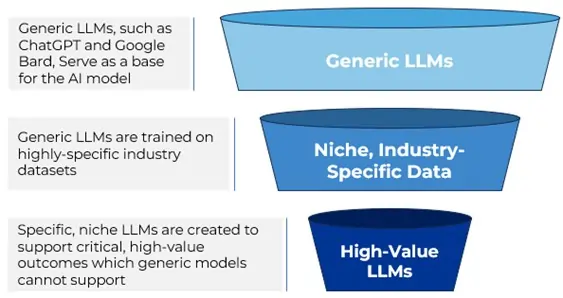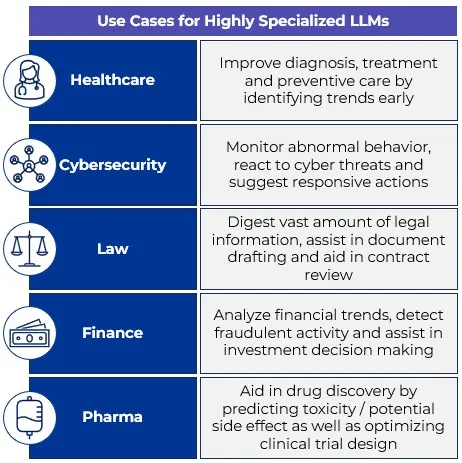2024 AI Trends: Accelerating sophistication of LLMs
By Solomon Partners Technology Group
A revolutionary era for artificial intelligence (AI) is on the horizon for 2024, particularly within advanced analytics. Taking center stage in this evolution are highly specialized Large Language Models (LLMs), which are poised to spearhead a new wave of innovation by offering unparalleled precision and customization that will transcend generic AI applications.
While foundational AI tools like ChatGPT and Google Bard have paved the way for current generative AI applications, their continued adoption has exposed an escalating demand for solutions that go beyond mere “out-of-the-box” use cases. There is a call for AI solutions that are intrinsically evolved to meet the diverse and distinctive requirements of various industries, especially in high-stakes fields such as medical diagnostics and legal document scrutiny, where the margin for error is minimal. In those cases, AI tools need to possess the capability to comprehend and navigate domain-specific nuances.
The growing demand for specialization signifies a pivotal shift from broad-spectrum AI applications to purpose-driven implementations. This transition is expected to stimulate the proliferation of sector-specific AI solutions, adept at interpreting and managing the complexities inherent to specialized datasets and tasks. The resultant AI models are anticipated not only to decipher industry-specific vernacular and procedures but also to provide insights and analytics with heightened accuracy and reliability.

The integration of these specialized models holds the potential for transformative outcomes. Advanced analytics, fortified by these AI systems, could significantly enhance decision-making capabilities, streamline operational efficiencies and elevate customer engagement. In the healthcare sector, the potential impact of specialized LLMs is particularly noteworthy. AI systems could precisely interpret complex medical imaging, leading to more accurate diagnoses and personalized treatment plans and potentially revolutionizing the delivery of healthcare services.
Similarly, in the legal domain, the unparalleled ability of AI to navigate and scrutinize vast volumes of legal documents with domain-specific expertise could lead to a paradigm shift. Specialized LLMs have the potential to reshape legal research, providing legal professionals with enhanced efficiency and accuracy in navigating complex legal landscapes.
The synergy between AI and advanced analytics is poised to redefine competitive dynamics across industries. Enterprises adept at integrating highly specific LLMs could secure a strategic edge, analyzing and assimilating massive datasets with a speed and scale beyond human capabilities. These specialized LLMs might become pivotal for businesses, enabling them to uncover opportunities, mitigate risks and tailor services in unprecedented ways.
Specialized data repositories of superior quality, serving as the backbone of LLMs, are set to become invaluable assets, fueling the efficacy of these models. Companies with the capacity to provide unique, pristine datasets are

likely to become central players in this emergent AI economy, influencing the trajectory of AI advancements.
The market may also witness the emergence of strategic alliances and synergies among AI technologists and data custodians. These partnerships could prove indispensable in overcoming the challenges associated with data procurement and refinement. By combining expertise in AI development with access to rich data troves, such collaborations could expedite the inception and deployment of potent, industry-aligned AI solutions.
As we look toward 2024, the trajectory of AI in advanced analytics foreshadows a scenario wherein AI transcends its role as a mere adjunct and becomes a cornerstone of corporate strategy. The ongoing refinement of these technologies is not a static process; instead, it is a dynamic evolution that aligns AI systems with the unique exigencies of the sectors they serve. AI is poised to become a vital catalyst in the quest for innovation and distinction, shaping competitive landscapes and determining the winners and losers across a diverse set of industries.
This article originally appeared on Global Banking & Finance.
Read the Original


